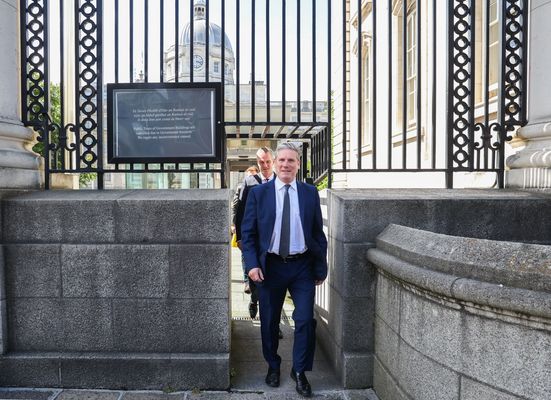2021 was supposed to be the year for two things to end and for one thing to become more under control but which would stick around more or less permanently. Brexit was to be done and dusted, and the pandemic would be conquered by vaccines. But Brexit is far from done, whichever side of the Irish sea you look, and the Covid-19 virus seems able to adapt and outpace vaccine development and deployment.
The climate crisis, however, will endure whatever COP26 came up with — which was much less than many hoped for.
On reflection, it was no surprise to find that Brexit, for 2021 at least, was more a theory than a practice and that Johnson’s government has yet to decide what type of Brexit to implement: full-scale de-regulation versus close alignment with the EU. This is seen most clearly in the postponement of the introduction of new British regulatory systems such as the UK Conformity Assessment mark for any goods intended for the UK market, which is supposed to replace the EU CE mark. It is also seen in the postponed implementation of import controls (now due 1st January 2022) even though the EU introduced its own controls a year ago at the end of the implementation period.
Businesses are “not persuaded” by UK’s new post-#Brexit UKCA safety & quality mark, replacing the EU’s CE mark on all products in the UK from 2023. It raises costs of duplicate testing caused by having two different regimes- survey by @britishchambers.
— Lyne Biewinga (@LyneBiewinga) December 20, 2021
https://t.co/Eo2zuWHmaV
Irish food exports to Britain will add 240,000 export health certificates to the 60,000 currently issued each year. Their introduction has already been postponed three times and the target date is now 1 July 2022 for meat and 1 September for dairy. This trade is worth about €5 billion.
ARTICLE OF FAITH
Of course, postponed implementation has been elevated to an article of faith this side of the Irish sea border, as to do otherwise would be to deprive us of English sausages and more generally violate 'the UK single market'. Lord Frost learnt that offending a sense of British sovereignty stirs more interest here in the North than it does in Britain itself: his Command Paper was littered with exaggerated claims of political instability and damaging diversions of trade.
Anyway, Frost has left the stage, as have Foster and Aiken, and all the signs are that Protocol politics not only caused the DUP some 'leadership issues' but also major credibility problems. The deadline for the threat to bring down Stormont came and went..
But he failed spectacularly to use loyalist and unionist discontent for the cause of little Englanders within the Tory party who hate the idea of the European Court of Justice presiding over any future disputes with the EU. For the Spartans, Brexit has hardly started.
Another failure was team Habib’s legal attempt to strike down the Protocol for breaching the Act of Union 1800. The former Brexit Party MEP mobilised Foster (DUP), Aiken (UUP), Allister (TUV), Lord Trimble and Baroness Hoey to back the case, only to be told by the High Court that the Withdrawal Act trumped the Act of Union. Habib wants to appeal this all the way to the Supreme Court.
All eyes on @trussliz !
— Ben Habib (@benhabib6) December 28, 2021
Will she have the courage to invoke article 16 or will she bend to the ECJ?
👇🏼👇🏼👇🏼 https://t.co/AkcgyJDhes
You could be forgiven for thinking that Lord Frost belongs somewhere on the spectrum of Habib’s pan-anti-Protocol front but you would be wrong. Frost’s 'principle before pragmatism' approach to the Protocol was not pure enough for the likes of Habib who now sees Frost as standing in the way of tax cuts and deregulation.
Anyway, Frost has left the stage, as have Foster and Aiken, and all the signs are that Protocol politics not only caused the DUP some 'leadership issues' but also major credibility problems. The deadline for the threat to bring down Stormont came and went, and the polls showed voters turning away from a once dominant DUP, albeit in different directions. Furthermore, few seem to be impressed by the DUP’s defiance of High Court rulings over non-attendance at North-South Ministerial Council meetings.
None of this means the DUP dream of replacing the Irish sea border with an ‘invisible’ hi-tech land border across Ireland is completely dead. Johnson may have his doubts and have a good appreciation of EU solidarity and the Biden administration’s position. But the Spartans, the European Research Group, Policy Exchange and the DUP’s Westminster MPs still believe their project is alive and deliverable by the likes of Fujistu.
Yes, Fujistu, developer of the faulty Horizon software which resulted in the Post Office wrongly prosecuting hundreds of sub-postmasters for fraud, false accounting or theft – sending some of them to prison – in what has been described as the biggest miscarriage of justice in British legal history. Liz Truss may keep the flame alight a little while longer, but only if it suits her leadership ambitions within the Tory party.
This isn’t a short talk, but it is very damning about how some people in the Post Office and Fujitsu knew the Horizon system didn’t work properly. And then either lied to government - or government has been told, and covered up that knowledge. https://t.co/GfjlsaZgUs pic.twitter.com/xgcQyhxrdz
— Charles Arthur (@charlesarthur) June 5, 2021
Above all, what became clear during the year was that the worst consequences of Brexit were being felt, not by those of us who remained in the single market for goods, but in Britain, even if Covid tended to be blamed for labour shortages, disrupted supply lines and the emergency deployment of military personnel in various roles. This inevitably fuelled the growing discussion around Irish unity and a border poll which reached a tipping point during the year, moving from the margins to the mainstream. And with this came the narrative that Southerners support the dream of unity but not the reality. The unionist argument that the North is unaffordable has already cast its shadow southwards.
DESPERATE DISCREDITED LEADER
What also became clear towards the end of the year was that internal Tory party disputes – and a somewhat desperate discredited leader – were increasingly driving Covid policy and not just the continuing arguments on Brexit. It would be wrong to suggest a complete overlap between Brexit Spartans and Covid libertarians currently warning Johnson against the reintroduction of public health restrictions. But the point is that public health and the NHS are becoming secondary to Tory party in-fighting, some of which concerns Rishi Sunak, himself a contender to replace Johnson as prime minister.
Meanwhile our own public health response is constrained by Sunak’s reluctance to spend a penny more on dealing with the pandemic. He was happy enough to borrow billions in 2020, providing it was dished out to private companies run by Tory mates. But even gravy trains have limits.
The main policy lesson around Covid from 2021 is that we will never get on top of it through vaccine nationalism and vaccines alone. It is all very well to boast about Britain’s vaccination programme and to claim, falsely, that “we've vaccinated more people as a percentage of our population than virtually anywhere else", as Johnson did just before Christmas. The problem is that vast numbers in low and middle income countries do not have access to vaccines and Covid has more global reach than even Britain had in its days of empire.
An unmitigated lie from @BorisJohnson: "We've vaccinated more people as a percentage of our population than virtually anywhere else" pic.twitter.com/KpmpnCLjaf
— Michael Vine (@mpvine) December 21, 2021
A number of rich countries, Britain included, have blocked the production of vaccines in Africa and elsewhere by opposing a waiver on intellectual property rights for Covid vaccines, pitching the fortunes of pharmaceutical companies above the interests of humanity.
Closer to home, “vaccine boosterism” encourages a mentality that vaccines are the one and only solution to Covid. This may be politically convenient for poets such as Sammy Wilson opposing public health restrictions on social contact, but it flies in the face of the evidence surrounding airborne virus transmission.
There are growing calls for the mandatory use of FFP2-quality masks, made freely available, and for air quality in schools and workplaces to be taken much more seriously. This will not only prevent Covid transmission but also moderate the effects of air pollution generally (which causes over 300,000 premature deaths each year in Europe alone), thereby reducing pressures on health services. Prevention is better than cure even if there is less money in it.
This amazingly awful thread is so painful to read. The failure to recognise that it is air that is the vehicle for transmission of #COVID19 not surfaces or objects is the most enormous error. Ventilation, filtration and good masks are crucial. https://t.co/Zo1yjJl2pD
— Dr Gabriel Scally (@GabrielScally) December 21, 2021
How does this relate to the climate emergency? Simple. If we lack the international solidarity to address the pandemic, how do we expect to deal with the climate emergency?
As Rachel Kyte says in this excellent C4 News report on Biden’s difficulties with the Build Back Better bill, “The most important point is the disgust that most developing countries feel at our complete lack of ability to come forward with a viable global vaccination plan. And the feeling is, if you can’t even do that, then will you really be there for us for this incredibly complicated transition to a decarbonised and more just society…?”








